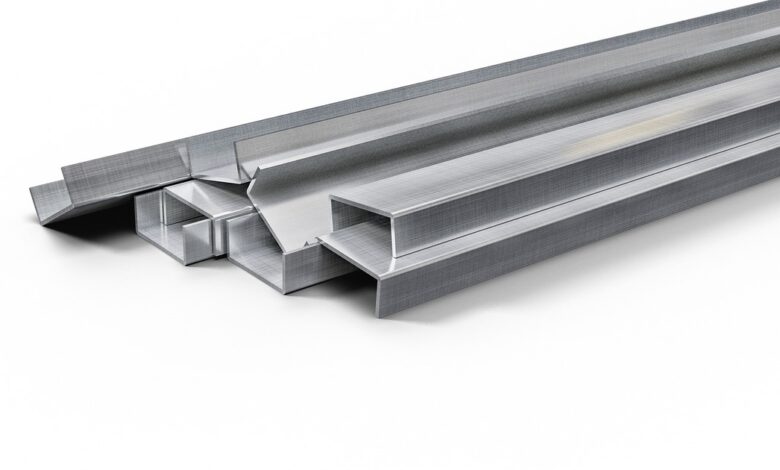Aluminum Profiles: Versatile Applications

Aluminum profiles are among the most versatile solutions in the construction and building industry. They offer not only exceptional durability but also an aesthetic appearance and lightweight nature, making them a popular choice in various fields. In this article, we will explore the primary applications of aluminum profiles and understand why they are highly regarded.
Read More: Incredible Uses of Scrap Metal in Different Fields
Advantages of aluminum profiles
Aluminum profiles offer numerous advantages across various industries. Here are some of the key benefits:
- Lightweight and Durable: Aluminum is a lightweight material while maintaining exceptional strength. This makes aluminum profiles easy to transport and handle during installation while ensuring long-term durability in various applications.
- Corrosion Resistance: Aluminum naturally forms a protective oxide layer that makes it highly resistant to corrosion. This property ensures that aluminum profiles remain unaffected by environmental factors, even in harsh conditions.
- Versatility: Aluminum profiles are highly versatile and can be easily customized to meet specific design requirements. They can be extruded into various shapes and sizes, making them suitable for a wide range of applications.
- Aesthetic Appeal: Aluminum profiles have a modern and sleek appearance that complements contemporary designs. They are often chosen for their aesthetic qualities, enhancing the overall look of structures and products.
- Eco-Friendly: Aluminum is a recyclable material, which makes aluminum profiles an eco-friendly choice. Recycling aluminum consumes significantly less energy compared to producing it from raw materials, reducing the carbon footprint.
- Low Maintenance: Aluminum profiles require minimal maintenance over their lifespan. They do not rust, and their surface is easy to clean, making them a cost-effective choice in the long run.
- Thermal and Electrical Conductivity: Aluminum is an excellent conductor of both heat and electricity. This property makes aluminum profiles suitable for applications where thermal or electrical conductivity is required.
- Wide Range of Finishes: Aluminum profiles can be finished in various ways, including anodizing, powder coating, or painting, allowing for customization in terms of color and appearance.
- Resistance to UV Radiation: Aluminum profiles are resistant to UV radiation, ensuring that they do not degrade or become discolored when exposed to sunlight, making them suitable for outdoor applications.
- Recyclability: Aluminum is highly recyclable, and recycling aluminum profiles consumes significantly less energy compared to producing them from raw materials. This makes them an environmentally responsible choice.
Window and door constructions
One of the most common uses of aluminum profiles is in the window and door manufacturing industry. Aluminum is a material that excels in these applications due to its durability and resistance to weather conditions. Aluminum profiles are lightweight, facilitating easy installation, while also being robust, ensuring the long-term functionality of windows and doors.
Industrial constructions
In the industrial sector, aluminum profiles find extensive use. They are employed in the construction of machine frames, conveyor belts, industrial hall structures, and many other components. Thanks to their strength and ease of machining, aluminum profiles enable the creation of precise and durable structures.
Furniture and interior furnishings
Another area where aluminum profiles play a vital role is in furniture and interior furnishings. Aluminum frames for chairs, tables, shelves, or display cases are durable and resistant to mechanical damage. Additionally, aluminum profiles allow for the design of modern and stylish furniture pieces.
Read More: Top 5 Welding Skills in High Demand
Lighting systems
In the field of lighting, aluminum profiles are used to create innovative lighting systems. Their flexibility enables the concealment of wires and LEDs, producing striking lighting effects in various spaces.
Electronics and technology
Aluminum profiles also find applications in electronics and technology. They are used in the construction of enclosures for electronic devices, rack cabinets, and other components that require durability and resistance to electromagnetic interference.
In summary, aluminum profiles are an incredibly versatile material that finds applications in numerous fields. Their durability, lightweight nature, and aesthetic appeal make them a popular choice for designers, engineers, and manufacturers. Therefore, it is worth considering these exceptional solutions when planning various projects.









